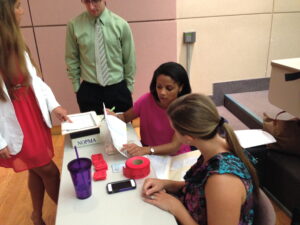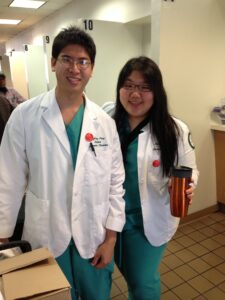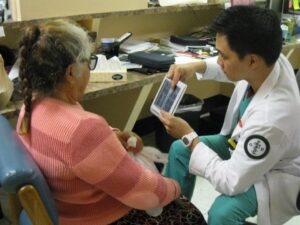Why did we specifically choose optometry as our future professions, when there are so many other options out there? It’s so easy to get caught up in our daily routines that sometimes we forget why we became so passionate about this career path to begin with.
Like a lot of people, I personally chose to pursue optometry because of the rewards this profession has to offer. The biggest ones for me include having a direct hand in helping my future patients, the diversity of the patient-doctor interactions that comes with that, and the long-term relationship that form in the process. Whether we recognize it or not, we’re “people people.” Our profession is one where we need to be able to carefully watch, diagnose, and treat our patients’ health needs, however, it’s just as important to be able to build strong personal relationships with them. These skills will make us more available to our patients needs and will help make us more successful.
 I learned about the idea of “humanizing” health care from my mentor, Dr. Craig Hisaka, OD, MPH (UC Berkeley). Dr. Hisaka opened my eyes to an aspect of optometry that now turns out to be my favorite, and that is building personal relationships with your patients by taking the taking the routine eye exam to the next level. I genuinely want to get to know my future patients beyond the four walls of the exam room as well as attending to their ocular health needs. Now this isn’t always practical given time constraints, but the concept is still worth noting. This opportunity to embrace the role of being a primary care physician truly separates our jobs from most other professions. So, here’s a few quick words, then my “5 Patient Care Tips to Remember” below:
I learned about the idea of “humanizing” health care from my mentor, Dr. Craig Hisaka, OD, MPH (UC Berkeley). Dr. Hisaka opened my eyes to an aspect of optometry that now turns out to be my favorite, and that is building personal relationships with your patients by taking the taking the routine eye exam to the next level. I genuinely want to get to know my future patients beyond the four walls of the exam room as well as attending to their ocular health needs. Now this isn’t always practical given time constraints, but the concept is still worth noting. This opportunity to embrace the role of being a primary care physician truly separates our jobs from most other professions. So, here’s a few quick words, then my “5 Patient Care Tips to Remember” below:
Empathizing With Your Patients
Empathy, empathy, empathy. Remember this word? It’s a good one. Don’t worry, I slipped this magical word into my personal statement a few dozen times too. We all know the meaning of the word, but how do we show this trait (or should I say talent) to our patients who are coming to us from so many different backgrounds. Each patient’s situation ranges from the familiar, to the vaguely familiar, all the way to things we honestly have no idea about. There’s nothing wrong with that. It’s all part of the learning curve.
A Unique Patient Encounter
If you want to talk about something that actually isn’t taught in school (aside from practice management, which is taught, but in minimal amounts), let’s start by talking about empathizing with your patients and how to react to unusual circumstances with them.
I was fortunate to have a chance to catch up with my long-time friend, Dr. Daniel Salas, Pharm D. who is now a resident pharmacist at Highland Hospital in Oakland, CA, where he gets to see quite the diverse patient pool. Our conversation is actually what inspired me to finally write this piece that I’ve been thinking about doing for so long. Daniel recently had a patient experience that went a little wayward, so I probed a bit and asked him how he dealt with the encounter. His latest patient was an elderly Vietnamese woman who was accompanied by her son, who was probably in his late 40s. This patient was being seen in the anticoagulation clinic after she suffered from a stroke.
Dr. Salas’ job was to consult and manage her medications, but it didn’t end up to be as simple as that. Things got a little awkward when her son revealed that he brought in some “very good stuff” from France. He reassured Daniel multiple times and insisted that this substance wasn’t like the other
 herbal drugs he’s seen before. He urged that it really worked, and he paid top dollar for it to be imported from France. Naturally, Daniel felt bad for the man, but had to find a way to make sure that
herbal drugs he’s seen before. He urged that it really worked, and he paid top dollar for it to be imported from France. Naturally, Daniel felt bad for the man, but had to find a way to make sure that
he understood that the prescribed medicine and regimen is what’s best for his mother’s health – without offending him or his patient. You can imagine how it progressed from here.
The point of this story is to demonstrate an area of health care that we often overlook, and that is patient interactions. Sure, we’ve got years of glaucoma education, and we’ve bested our ocular disease courses and can diagnose refractive errors like it’s nobody’s business, but we can’t overlook the fact that our patients are real people. What we say and do actually has an impact beyond the routine eye examination! They’ll remember how well you took care of them, including little things like the way you greet them and the way you see them off. Always remember that you have a direct hand in the quality of their lives – it’s not called patient care for no reason!
5 Patient Care Tips to Always Remember
1. Don’t talk down on your patients. It’s actually easier to do than you might think.
Embrace their presence and make them feel appreciated. Taken from Dale Carnegie’s timeless classic How to Win Friends and Influence People, he quotes Ralph Waldo Emerson, “Every man I meet is superior in some way. In that, I learn from him.” If we can show our patients how genuinely interested we are in their lives, as well as what they can bring into our offices, they’ll feel appreciated and will likely return because they know they’re in good hands. It’s basically a win-win if you think about it.
Remember, not all of our patients have years of science background, so keep the fancy words to a minimum. Unless of course your patient happens to be one of those people who insist on schooling you, in which case you can return the favor. (Don’t actually do this!)
2. Always smile – a good smile can go a LONG way.
This is a simple idea that shouldn’t surprise anyone. Smiling is contagious! Your positive vibes will rub off on your staff and in turn keep your patients happy as well. Here’s a rich quote we can all learn from: “A man without a smiling face must not open a shop,” and in this case, he or she should also not open an optometric practice. Zing.
3. Call people by their names.
If you pay attention, you’ll notice that people who are good speakers will use your name a lot when they speak to you. As Dale Carnegie puts it (really guys, you should read this book), “A person’s name is to that person the sweetest and most important sound in any language.” I couldn’t have said it any better myself. Thanks, Dale.
4. Bake a bigger pie.
 What? In Guy Kawasaki’s phenomenal book Enchantment (which I recommend for aspiring practice owners), he says that people are either bakers or eaters. The bakers want to bake a bigger pie while the eaters want to eat a bigger slice of the pie. Kawasaki elaborates by saying that “Eaters think that if they win, you lose, and if you win, they lose. Bakers think that everyone can win with a bigger pie.”
What? In Guy Kawasaki’s phenomenal book Enchantment (which I recommend for aspiring practice owners), he says that people are either bakers or eaters. The bakers want to bake a bigger pie while the eaters want to eat a bigger slice of the pie. Kawasaki elaborates by saying that “Eaters think that if they win, you lose, and if you win, they lose. Bakers think that everyone can win with a bigger pie.”
That’s a more colorful way of saying what we’ve all heard before: think about your patients first. Having an “eater” mentality as an optometrist will get you in trouble. It’s just plain selfish! As primary health care providers, we’re in a great position to help our patients, and if we keep thinking “bigger” in ways that benefit our patients, then we’ll naturally become more trustworthy. If your patients know they can trust you, they won’t be afraid to recommend you to more family and friends. Having a strong network is always important when you’re building a new practice.
5. Read the signs to see what your patient is saying.
In the case of Dr. Salas’ patient, he had to handle the task of convincing his patients’ resistant son that his herbal medicines most likely wouldn’t work in treating her condition. The key here is that he had to tread carefully so as to have him agree with Daniel without feeling rebuked. This takes a lot of “going with the flow” and “reading the signs.”
Daniel Goldman, author of Emotional Intelligence: It Can Matter More Than IQ, illustrates this idea by showing us how emotions aren’t always so obvious. Essentially, we must learn how to read minds: “People’s emotions are rarely put into words, far more than they are expressed by other cues. The key to intuiting another’s feelings is in the ability to read nonverbal channels, tone of voice, gesture, facial expression and the like.”
I’ll give you a minute to digest that one. As clinicians, we’re trained to notice a lot of things about our patients’ health and well-being, like when we record “AOx3” on our exam sheets. But we don’t always notice their emotions, which is also very important. If we can expand our level of health care beyond the routine exam by “humanizing” it (mentioned earlier), we can elevate the quality of our patient care to the next level. It takes practice and seeing lots of people, but that’s something we’ll always be working on as we build our professional health careers.
Lastly, Think Big.
In wake of the noise surrounding the release of Divergent (sci-fi nerds, this is mostly for you), what Veronica Roth taught me is that it’s important to not always think about your own success, but to also concern yourself with the success of those around you. This philosophy will carry you and your practice far, especially if you see yourself working in a multi-doctor practice. A positive and constructive attitude is accepted everywhere. As Roth compellingly puts it, “I have a theory that selflessness and bravery aren’t all that different.”
So be brave future O.D.s, our futures are bright.
I want to take a moment to thank Dr. Daniel Salas for taking time to share his patient encounter.

